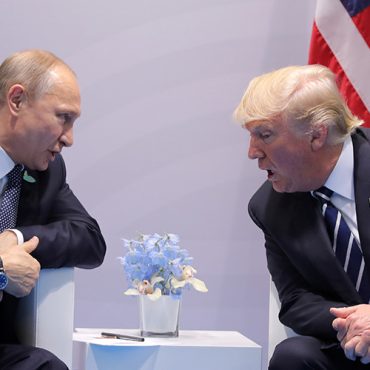This is a rush transcript. Copy may not be in its final form.
AMY GOODMAN: This is Democracy Now!, democracynow.org, “War, Peace and the Presidency.” I’m Amy Goodman.
As we continue to look at where the Democrats went wrong, we’re joined now by David Sirota, founder and editor-in-chief of The Lever, host of its new investigative podcast Master Plan, his new piece headlined “Election 2024: How Billionaire Avengers Destroyed Democracy.”
Those billionaires, David Sirota writes, included Elon Musk, who spent about $120 million to help Trump get elected and saw his net worth soar by over $16 billion after Trump secured victory. Other billionaires campaigned for Kamala Harris, such as Mark Cuban, who was her top TV surrogate, and Illinois Governor J.B. Pritzker, who spoke at the Democratic National Convention in August. This is a clip.
GOV. J.B. PRITZKER: Donald Trump thinks that we should trust him on the economy, because he claims to be very rich. But take it from an actual billionaire, Trump is rich in only one thing: stupidity!
AMY GOODMAN: For more on how the Democrats lost the election and what is next, David Sirota joins us from snowy Denver, Colorado. His August piece for The Guardian is headlined “Project 2025 started a half-century ago. A Trump win could solidify it forever.” And David Sirota was also senior communications adviser and speechwriter for Bernie Sanders when he ran for president.
Welcome back to Democracy Now!, David. Talk about the billionaires.
DAVID SIROTA: Well, look, I think what was different about this election — and to be clear, there’s been billionaires funding elections from the shadows, certainly an upsurge of that since the Citizens United decision. But I think what was different about this election was how central billionaires were in the entire political discourse. I mean, billionaires were on the national stage: Elon Musk, Mark Cuban. You had billionaires like Reid Hoffman, Barry Diller demanding — if Kamala Harris won, demanding the firing of FTC Chair Lina Khan. So, billionaires were really in our face this time in a way that they really haven’t been before.
And billionaires, I should mention, were celebrated. That clip that you just played of billionaire Governor J.B. Pritzker and the Democratic convention celebrating billionaires as a credential. And that speech came, by the way, right after Bernie Sanders spoke at the Democratic convention saying we’ve got to essentially reduce the power of billionaires in politics.
So, we’ve come a long way — and, in my view, not in a great direction — towards our elections being celebrations of billionaires, our elections being battlegrounds for billionaires to have their fights, to center their issues. And essentially, what ends up happening is, is that the 2024 election, that was supposed to be about saving democracy, was essentially an exercise in destroying what was left of democracy, turning our elections themselves into an open celebration of the oligarchy. And I think if we simply walk away from this election and say, “Hey, the Democrats lost because they didn’t have enough billionaires, and the Republicans won because more billionaire money went to Donald Trump,” and we define our democracy as just a battle of billionaires, then the question is: In the battle to save democracy, what are we actually saving, and for whom?
AMY GOODMAN: So, during the presidential campaign, as you just said, two major Democratic donors, media mogul Barry Diller, LinkedIn co-founder Reid Hoffman, publicly called for Kamala Harris to fire the head of the Federal Trade Commission, Lina Khan, who’s led Biden’s antitrust efforts. Hoffman sits on the board of Microsoft, which was sued by the FTC. He was interviewed on CNN by Jake Tapper.
JAKE TAPPER: Thanks for joining us. So, you and other big-money donors are giving money to Vice President Harris, suggesting also that she replace the head of the FTC, which impacts policy and the economy. What do you say to somebody who watches this and says, “This isn’t how American politics should work, rich people getting to buy levels of influence”?
REID HOFFMAN: Well, I totally agree with not buying levels of influence. I separate my role as a donor and expert. So, if you asked me as a donor, I say I’m giving money to Kamala Harris because I think she’s the best future president for the U.S., for business, for a bunch of other things. If you ask me as an expert about what, you know, kind of Lina Khan is doing and whether I think she is helping or hurting America relative to your anti-merger policies, which are, you know, mostly to bring litigation, versus, you know, really solidly grounded in kind of what’s going on and what helps American business thrive here and overseas, then I give an expert opinion. But I think donor and expert should be kept separate, and I’ve never tied the two ever, in any conversation anywhere I’ve ever had.
AMY GOODMAN: So, that’s billionaire Reid Hoffman, supporter of Kamala Harris. David Sirota, since economy was a top issue, inflation a top issue, if you can talk about what it meant to be against Lina Khan and what she represented, but, most importantly, the power of these billionaires, and not just, of course, on the Democratic side, because the Republican who won, President Trump, he had Elon Musk giving out a million dollars a day to voters?
DAVID SIROTA: Look, I think the Lina Khan example is really important, because while Reid Hoffman insists that his money has nothing to do with his policy demands, functionally that’s not the way things work. I mean, Joe Biden back in the 1970s talked about this when he first got elected, about how money always comes with a demand. Money always comes in politics with strings attached. Functionally, the way this works, these people are not giving money simply out of the goodness of their own — of their hearts. They want things. They have policy demands.
And I think, as you mentioned, Elon Musk, that’s another great example. I mean, Elon Musk running around, spending big money to help elect Donald Trump, while saying he’s going to accept a job in the Trump administration, Donald Trump saying he’s going to appoint him to a job, a job that would oversee the reshaping of federal spending and the federal budget, at a time when Elon Musk runs companies that are major federal contractors. So, in a sense, Elon Musk could be in a job where he could shape the government to enrich the companies that Elon Musk owns. This is what money in politics really is. It is an investment. And the investors, the donors, like billionaires, are looking for a return on their investment. That’s what this is, a business strategy.
AMY GOODMAN: So, let’s talk about what Musk is going to get in return. You report that the Senate Republicans’ scheme to let Trump self-police ethics — “Republicans have been blocking the appointment of the government’s ethics enforcement official until after the election — so that Trump can now appoint,” as you put it, “his own crony who can waive all ethics laws for his new White House.” And then address the issue of Project 2025.
DAVID SIROTA: So, the Office of Government Ethics is the independent office that is supposed to enforce anti-corruption rules when it comes to the executive branch. When executive branch officials come into office, the Office of Government Ethics reviews whether they have conflicts of interest in their own holdings, and then will say, “You have to divest from this or that,” if your job is overseeing things that pose a conflict of interest for you.
The Republicans — that job has been held open, blocked in the Senate by the Republicans for more than a year, that job kept open. And Senator Mike Lee of Utah has said he wants to keep it open. He said this in a floor speech in the Senate, saying they want to keep it open until after the election, so that if Donald Trump wins, Donald Trump can appoint his own head of the Office of Government Ethics to a five-year term, which, in practice, would allow Trump to hire somebody who he would already know was going to enforce or not enforce this or that ethics laws for incoming executive branch officials. So, would somebody like Elon Musk get a waiver from anti-corruption laws? Would any other billionaire serving in Donald Trump’s Cabinet get those kinds of waivers to allow them to essentially serve in dual roles, owning companies but also running federal agencies that regulate those companies?
And as it relates to Project 2025, one of the central tenets of Project 2025 is the initiative to help Trump appoint more political loyalists — in other words, decimating the civil service, the supposedly and supposed to be nonpartisan civil service. Again, when you think about packing the executive branch with Trump loyalists, Trump loyalists who may have financial conflicts of interest, and then consider that Trump will be able to effectively appoint his own person, his own political loyalist, to oversee the enforcement or nonenforcement of anti-corruption and ethics laws, it puts together a situation where people may be coming into the government who are able to use the government to enrich themselves.
AMY GOODMAN: Can you talk about what Musk and Trump have been promoting, leading a new Department of Government Efficiency, the initials DOGE, or Doge, also referring to that meme coin cryptocurrency that Musk has been promoting?
DAVID SIROTA: Yeah, I mean, the best we can tell from what has been described is that Elon Musk is going to head up some kind of commission, potentially with a lot of cross-agency power, to propose and enact a radical reshaping of the federal government, and potentially a radical privatization of government services, government activities. And again, I go back to the fact that Elon Musk runs companies that benefit from government privatization, contractors, SpaceX as the big example. So, Elon Musk, the world’s richest man, could be in a position to make recommendations about what government services to privatize, a privatization agenda that could ultimately send more contracts to the companies that Elon Musk owns.
AMY GOODMAN: David Sirota, thank you so much for being with us, founder and editor-in-chief of The Lever, host of the new investigative podcast Master Plan. We’ll link to your new piece, “Election 2024: How Billionaire Avengers Destroyed Democracy.”
Next up, we go to Amman, Jordan, to speak with Jan Egeland, secretary general of the Norwegian Refugee Council. He’s just left Gaza. UNICEF and other groups describe conditions there as “apocalyptic.” Stay with us.











Post comments (0)